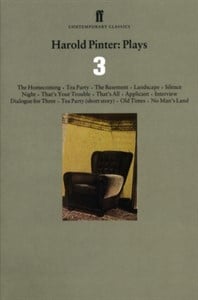
In Stock
Harold Pinter Plays 3
Usually dispatched in 1 business day
Overview
As The New Yorker describes: "TEA PARTY is about a middle-aged self-made business man named Sisson who engages a young secretary, marries a beautiful young second wife, and takes his new brother-in-law into his business—all in the same day. Mysteries abound. What is going on between the wife and her brother? Are they indeed brother and sister? Sisson has his doubts about that (and so do I). Why does Sisson feel that there must be something wrong with his eyes, although he knows that he can see clearly and his eye doctor has assured him that his vision is perfect? He forces his secretary to tie a chiffon scarf over his eyes, and then he is able to make a pass at her, in response to one of her many come-ons. Ordinary events assume a sinister tinge. Sisson's two sons, giving him the deadpan treatment that little boys have been inflicting on their elders from time immemorial, seem as eerie as characters out of a ghost story. Always the questions remain. Is there a conspiracy against Sisson, as he appears to suspect? Or is he in the fix he is in—on the brink of madness, and over it—because of sexual panic and social insecurity? At the tea party that ends the play, he sits in a catatonic state, his eyes tightly bandaged, and the guests—everybody we've met so far—alternately chatter and whisper, ignoring him." And leaving the answers, almost but never quite offered, to tantalize and intrigue.
Want to perform this show?
Cautions
- Mild Adult Themes
Details
- Target Audience: Adult, Senior, Teen (Age 14-18)
